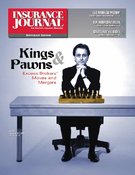Nebraska state Sen. Jeanne Combs used to weigh more than 300 lbs., and she hopes that fact will carry some weight in her campaign to prohibit people from suing the fast-food industry for making them fat.
Combs, who represents District 32 in Nebraska’s nonpartisan, unicameral Legislature, said she now weighs 165 lbs. because she had gastric bypass surgery in 2001 and switched to a more healthful lifestyle of diet and exercise.
“The reason I was fat was not because of watching skinny people eat McDonald’s food,” Combs said. “It’s a matter of personal responsibility. It is not the fault of someone who serves food that we purchase if we become obese.”
Combs’ bill, called the Commonsense Consumption Act, bans lawsuits against food manufacturers or restaurants over weight gain or obesity and is similar to legislation being considered in 17 states this year, according to the Virginia-based Health Policy Tracking Service.
The first of these so-called “cheeseburger bills,” a term coined by the Congressional Research Service, became law in Louisiana in June 2003. At least 12 other states enacted measures in 2004 to prevent people from suing fast-food restaurants or food manufacturers on grounds that their food is to blame for causing obesity or related illnesses such as heart disease, diabetes or hypertension. Congress considered a similar bill in 2004, but it failed.
Other states with laws to shield the fast-food industry from lawsuits are: Arizona, Colorado, Florida, Georgia, Idaho, Illinois, Michigan, Missouri, South Dakota, Tennessee, Utah and Washington.
As impetus for their legislation, several lawmakers cited dismay at a class-action lawsuit re-instated in federal court in New York last month that claims the McDonald’s food chain caused the plaintiffs’ obesity. Amy Winterfeld, who tracks obesity issues for the National Conference of State Legislatures, said state lawmakers also see the bills as part of broader tort reform efforts.
Proponents of these bans, including the National Restaurant Association, say they’re needed because the cost of frivolous lawsuits is passed along to consumers and that the fast-food industry is being unfairly targeted.
Supporters also underscore the idea that people should take responsibility for their own health and well-being. “Any type of food can be healthy, so long as it’s eaten in moderation, so long as it’s eaten as part of a balanced diet and as part of lifestyle that includes regular exercise,” said Virginia Del. Bill Janis (R), an attorney sponsoring a “cheeseburger” bill. “The notion that somehow food is unhealthy when I eat too much of it, I don’t have a balanced diet and I don’t exercise regularly, where’s the accountability? Where’s the responsibility?”
In New Mexico, state Sen. Steve Komadina (R) is sponsoring the “Right to Eat Enchiladas” act, which would preclude people from claiming in court that they didn’t know the nutritional content of their food.
Opponents say the bans against lawsuits are unnecessary and can give legal immunity to the fast-food industry, which they contend should share responsibility for public health by giving consumers nutritional information. Maine state Sen. Margaret Craven (D), for example, introduced legislation to require restaurants with more than 20 locations to list caloric information on menus and menu boards.
In Wisconsin, Gov. Jim Doyle (D), a former attorney general, vetoed a “cheeseburger” bill last March. “This legislation is a solution in search of a problem,” he said. “There have been only a handful of lawsuits nationwide, all dismissed, and none in Wisconsin. … I have great confidence that our judges and juries will respect the law and apply common sense and quickly dismiss any frivolous litigation.”
The Washington, D.C.-based Center for Science in the Public Interest opposes prohibiting obesity lawsuits.
“If you market products to children that cause disease, and you do it in a way that conceals the risks from parents, you may end up explaining your actions to a judge or jury. That’s hardly a radical notion,” the group’s executive director, Michael F. Jacobson, said.
Madigan is a staff writer for www.stateline.org, an online news publication that reports on state
Was this article valuable?
Here are more articles you may enjoy.


 AI Lost Out to Traditional Models in Forecasting NYC’s Blizzard
AI Lost Out to Traditional Models in Forecasting NYC’s Blizzard  Mexico’s Cartel Violence Could Hit Economy and Insurance Segment: AM Best
Mexico’s Cartel Violence Could Hit Economy and Insurance Segment: AM Best  Hedge Fund Fermat Says Surge in Cat-Bond Sales Is ‘Breathtaking’
Hedge Fund Fermat Says Surge in Cat-Bond Sales Is ‘Breathtaking’  Sompo Holdings Completes Acquisition of Aspen, Taking it Private
Sompo Holdings Completes Acquisition of Aspen, Taking it Private 


